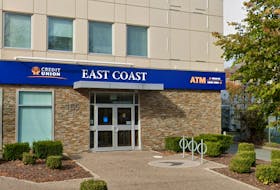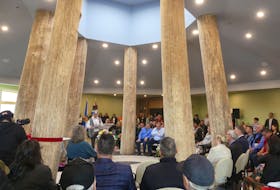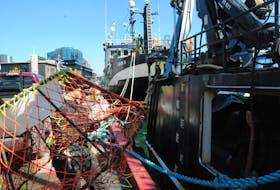ST. JOHN'S, N.L. — Kids can go through phases when thinking about what sort of career they want to pursue as an adult. TV shows or their parents' line of work might influence some early contenders before they develop more concrete ideas moving through high school.
Craig Rowe would love to see more of those teens consider a career in Newfoundland and Labrador's burgeoning technology sector. His company, ClearRisk, is one of several in the province that's made inroads into connecting with the province's K-12 system to try and strengthen the local talent pipeline.
"For a long time, you'd hear people say, 'Technology is the future.' Well, that's so clichéd that it's silly now," said Rowe, the CEO and founder of the St. John's software company. "Technology is everything and it's everywhere."

The pipeline of talent needs a substantial boost in the years ahead. The job market is competitive, with the success of Verafin — a local firm Nasdaq purchased last year for US$2.75 billion — forcing smaller companies to work extra hard to attract the right candidates.
"(ClearRisk) came through the Genesis Centre (Memorial University's innovation hub) four years after Verafin," Rowe said. "Verafin was more mature than us, and almost from the beginning, we've been competing with Verafin. We'd lose people to Verafin. That's a familiar story.
“Verafin is incredibly successful and I think it's one of the best things that's happened to the tech sector in Newfoundland, if not Canada. But, it's a double-edged sword. Having big successful companies growing that fast drives the demand for talent. It drives the cost of talent up, which is a good thing for the workforce — you're getting higher wages. But there's only so much talent in a small province like this."
Next generation
With that in mind, ClearRisk and other local tech companies, including Verafin and Genoa Design International, have reached out to the next generation of potential computer science grads through mentorship and internship opportunities. techNL, the industry organization Rowe chairs, has likewise engaged the province to make sure both the K-12 and post-secondary education systems can help fill those positions in the coming years.
"There are lots of opportunities here, but they need to be aware of them and they need to be prepared for them," Rowe said.
Exciting news for the province of Newfoundland and Labrador along with our ClearRisk academy. Craig Rowe, ClearRisk CEO sits in on announcement on behalf of @_techNL board about the technology and innovation partnership for high school students.https://t.co/1YNHYx2jkx
— ClearRisk (@ClearRisk) December 15, 2020
ClearRisk Academy is an in-house program engaging high school students through internships and mentorships. There have been some discussions with the administration at Holy Heart of Mary High School in St. John's and Newfoundland and Labrador English School District (NLESD) about creating a more formal arrangement, but Rowe got a head start by bringing his son and some of his friends from the school into the fold.
A business school intern and computer science intern, both from Memorial University, created a curriculum as part of a three-day-a-week program where the participating students were paid to learn about basic programming and some of the business skills associated with ClearRisk's operations.
"At the end of the summer, they all liked the business side more," Rowe said of the four high school interns, adding he eventually hopes to work with applicants for the program. "We kept them on, and they come here two days a week after school. We're still doing some teaching, but now, we're giving them projects. They're doing some research for us, some basic coding. With more exposure, there's a couple of them that are now leaning towards the tech side."

Startup sees the need
This is something even young startups are keeping in mind. Julian Au is the co-founder and CEO of SkyTop Technologies, a company developing an education-specific communication platform for students, as well as a cloud-based desktop alternative. Building on a conversation he had with Holy Heart administration, Au’s company will help students learn about coding and get them to test their beta product.
"With what's going on with Newfoundland right now, we're seeing there's a large emphasis in technology," Au said. "Technology can actually bring about a lot of jobs … In maybe the next 10 years, most jobs might be incorporated with technology. The basic thing you're going to have to be learning is coding ... Say if you're a business person. Coding is going to be basics for you.”

For a number of years, Brilliant Labs has helped with the technology curriculum at K-12 schools throughout the Atlantic region. Today, it's active in about 85 per cent of schools throughout Atlantic Canada. Executive director Jeff Willson cautions in some cases, that may only be one class in the school, so he acknowledges there's plenty of room to grow.
Willson credits private industry and provincial governments for helping the non-profit grow, as well as various school boards and educators getting on board and supporting the organization's work. Brilliant Labs has programming to reach all levels, from the earliest grades through to high school. The ultimate goal is to get kids excited about coding, robotics and digital skills — unlocking their potential to create, innovate and address the world's challenges. In addition to in-school activities, Brilliant Labs runs summer camps and offers after-school programs.

Trying something new
In Newfoundland and Labrador, Brilliant Labs is active in 95 per cent of the schools. Provincial co-ordinator John Barron said teachers have been consistently willing to embrace what they do. Starting out with the K-6 grades in its first year in the province, it now does work with all grades.
"A big part of that is the way we approached it, but another big part is the groundwork that was laid by the team Atlantic," Barron said. "We've learned so much from how they roll things out and how they were successful (in other provinces). That's working for us here just as well as it could be."
At the K-6 level, Barron finds children are wide-open when it comes to trying out new things, and this works to their advantage. At the junior high level, getting started can take a bit of time, but once the excitement is there for learning, it sticks. That works similarly for high schools.
Meet our upcoming speaker Tosca Terán, an interdisciplinary artist who founded nanopod: Hybrid Studio maker space and has translated biodata from non-human organisms into music! Join in on the conversation on February 18th!
— Brilliant Labs (@brilliant_labs) January 27, 2021
Learn more and register here: https://t.co/x66tUxYlZM pic.twitter.com/ObhOt8MvHi
"We've been doing work in high schools in career development classes, English language arts classes and math classes all across the province, and I'm still hearing the same exclamations," he said. "Whatever work we're doing, wherever we're doing it, we're hearing that excitement, because the kids are just like, 'Holy cow! That's really cool!' And it's easy for us, because we're drop-ins. We're new."
During the COVID-19 pandemic, Brilliant Labs has taken further advantage of that drop-in allure, as it's one of the few groups being physically allowed into the classroom in Newfoundland and Labrador — its work elsewhere in the Atlantic region with schools is presently virtual.
"And because the pandemic required a lot of innovation both in health and technology sectors across the world, the need for innovation now doesn't stop just because we're in a pandemic," Willson said. "If anything, it's more important now. The work that John and his team are doing, no one is going to close a door and say, 'It's not time to innovate anymore. It's not time to learn technology' ... Social and emotional wellbeing and health, all that is super important. But then closely after that is this drive for innovation and inspiring the next generation of researchers, engineers, scientists, doctors and technologists and digital skills people that we need."
"There was 17, from what I understand, computer science grads from Memorial University last year. Verafin could have hired 200 last year. MUN needs to increase its capacity, but also, more kids need to be coming up." — Craig Rowe
Educational initiatives
In Newfoundland and Labrador, techNL is getting provincial government funding to set up a team tasked with addressing the local talent gap, and one member of that team will be dedicated solely to working with high schools.
Late last year, government also announced a new technology-focused curriculum and a memorandum of understanding between the province, NLESD and the College of the North Atlantic (CNA) to facilitate a technology careers pathway program. Eight high schools will participate in a pilot project as part of the program, with students learning about coding and receiving credits transferable to post-secondary institutions.
As much as he wants youth to show interest in careers in the tech sector, Rowe said more opportunities are needed at the post-secondary level locally for students to get the necessary skills. Capacity at the university and college level is not where it should be. While some private colleges and CNA are stepping up with new programs and increased capacity, Rowe said there's still work to be done.
"There was 17, from what I understand, computer science grads from Memorial University last year," he said. "Verafin could have hired 200 last year. MUN needs to increase its capacity, but also, more kids need to be coming up. But that's going to be a bottleneck until that's fixed.
"What if next year, we do a good job and lots of kids realize what the potential is of the tech sector, and what if 500 kids come out wanting to do computer science? They can't. They're going to have to do it somewhere else, or go to CNA or a private college."
Andrew Robinson is a business reporter in St. John's.
@CBNAndrew








